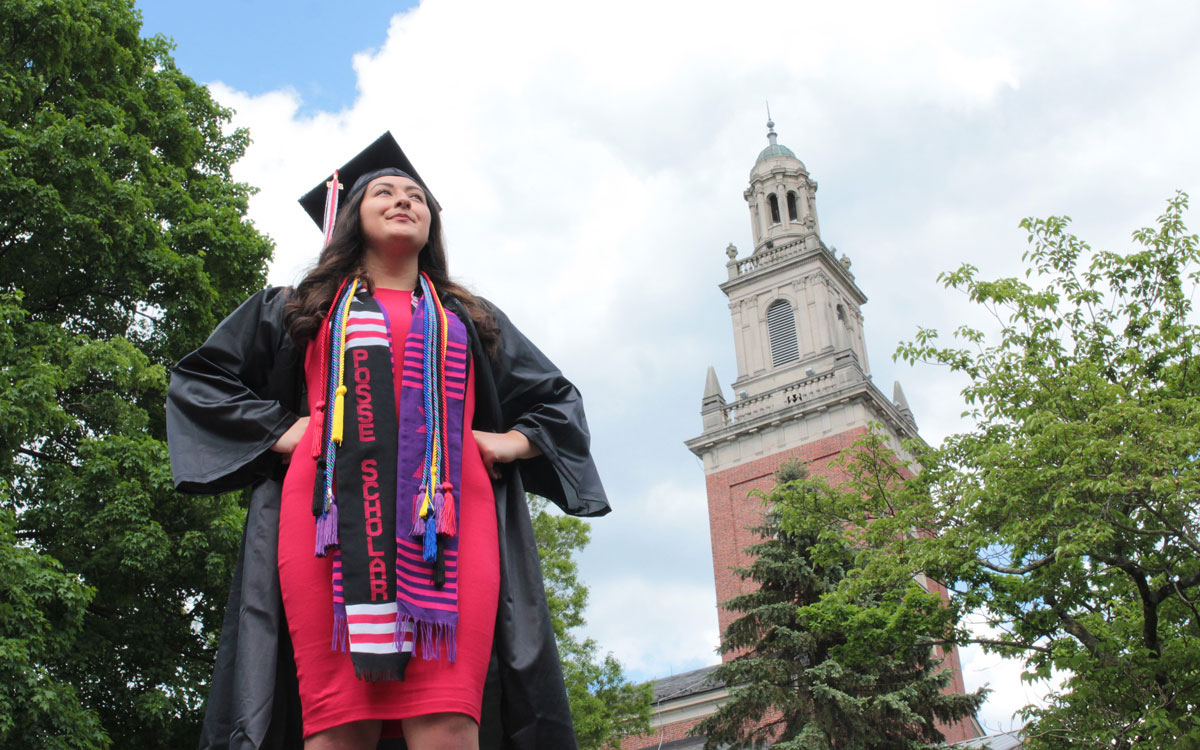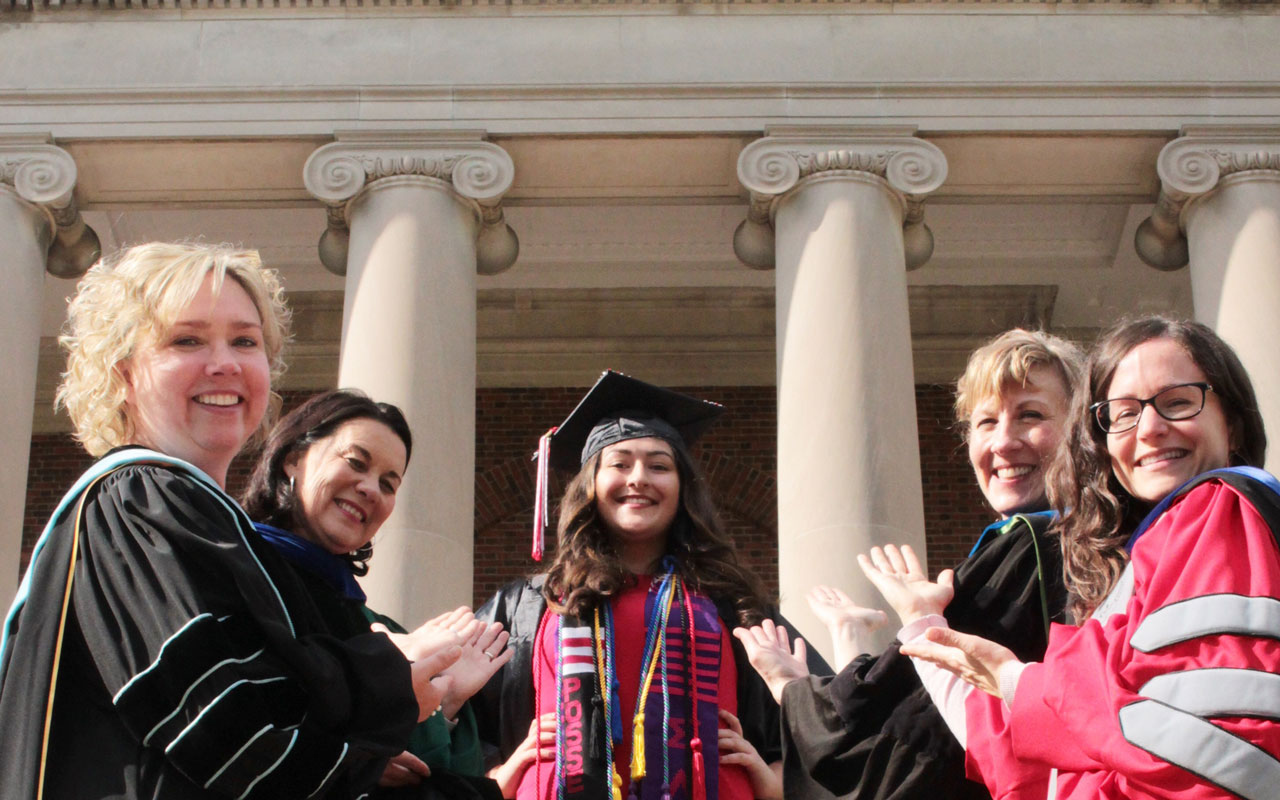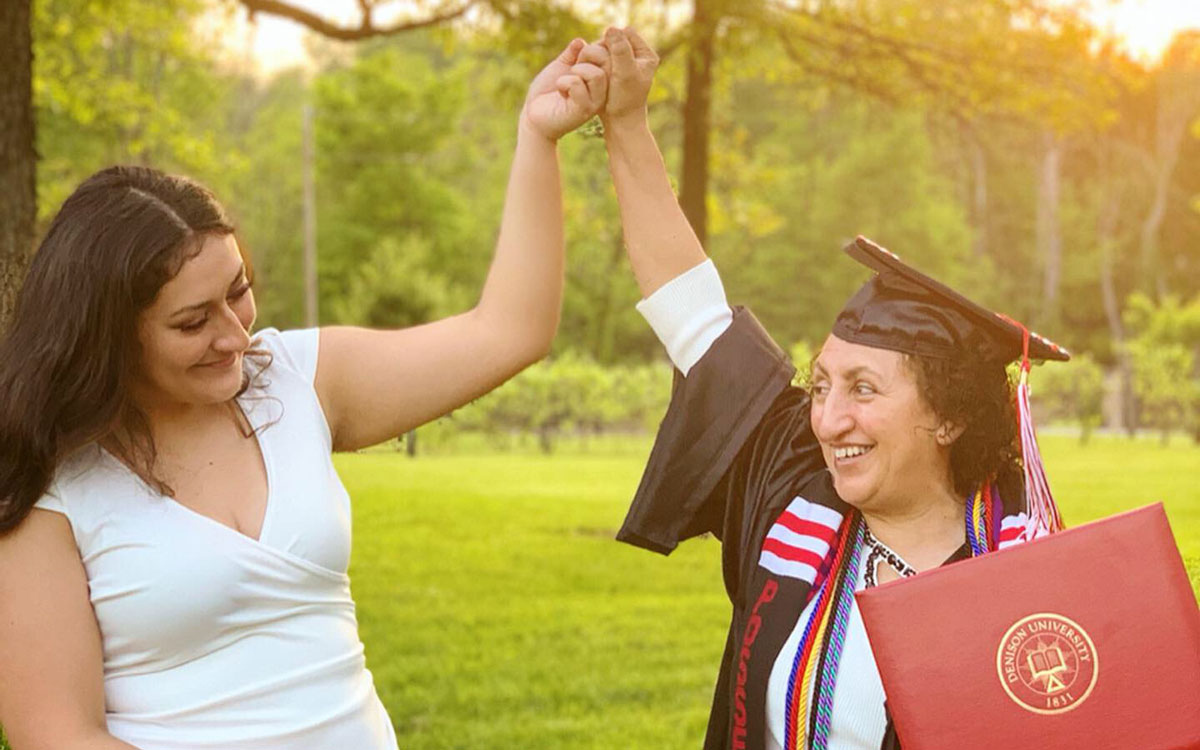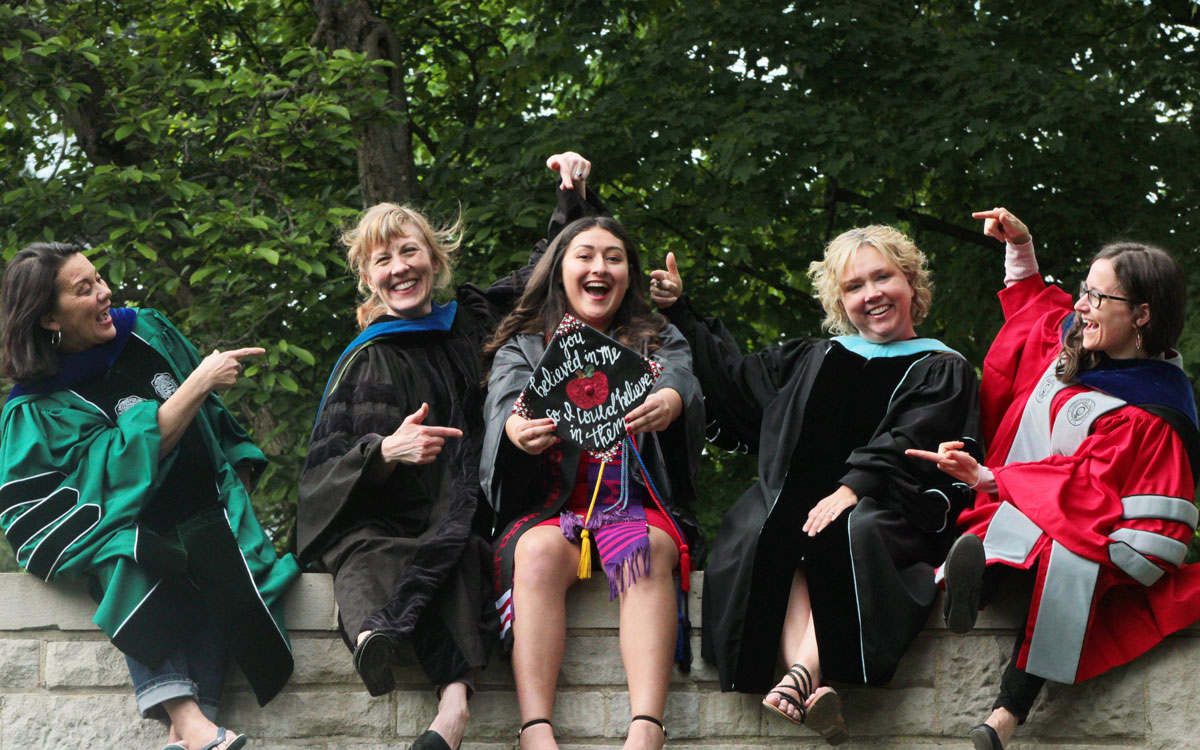



Kristen Ago ’19 is a first-generation student who majored in psychology and educational studies and minored in Spanish. She shares her Denison experience in a speech written for Commencement 2019.
My name is Kristen Ago. I am a senior majoring in Psychology and Educational Studies, minoring in Spanish. I am a Posse Scholar from Boston, and although I love to rep all great things about Boston, I am actually not from there. I am from a city north of Boston, called Lynn. Lynn is a low-income city with a large Hispanic population. Fun fact – if you ever happen to be in Lynn, and you have a Snapchat, scroll through your filters and you will find a geotag that says “Lynn, city of firsts.” I will tell you that we are not often the firsts in sports teams and we are definitely not the firsts on the lists of cities to visit when in Massachusetts, but I am pretty proud to say that I will be one of Lynn’s firsts when I graduate with my bachelor’s degree this May 2019.
I find first-generation college students to be some of the most daring individuals we encounter – Imagine driving a car without headlights for hundreds of miles in absolute darkness. You have no source of navigation or guidance and cannot possibly predict where the road will take you. You have encountered a few street lights along the way that have somewhat helped you envision the road ahead, but you continue to feel terrified, lost and alone. The one thing you do know is that you have a responsibility to arrive at the destination and if you don’t, you will have disappointed the people expecting you to get there. In many ways, this is exactly what we as first-generation college students experience.
We enter four-year commitments under-equipped – without much guidance, knowledge, experience or preparation to truly know what we will have to confront in a college setting in order to arrive to that final destination. For example, no one had warned me that professors wouldn’t create guided notes for us. You know, the handouts your high school teacher would pass out at the start of class and all you had to do was fill in the blank by copying the word down from the PowerPoint? Nope. That is nonexistent… but you better make sure you are paying close attention when the professor is talking because once you miss one word when writing down the notes you are now taking ON YOUR OWN, they might just be useless come exam day.
Earlier, I mentioned that I was a senior and recently, I had to ask myself an unfortunate and somewhat embarrassing question, “why didn’t I know about the GRE or what it was until this past October?” (For those of you who don’t know, you can thank me later) The GRE stands for the Graduate Record Exam, which is a standardized test that is required to be taken if you are applying for graduate school. It seems like something important a senior should know about, especially since it requires a ton of studying and preparation, right? Yet, I didn’t. I didn’t because unlike my non-first-generation college student peers, my parents lacked the experience and knowledge about the post-grad planning process that would inform me and guide me into making decisions relevant to higher education and/or career development. First generation college students: we are the pioneers of our journey, exploring and making many discoveries along the way.
There are many other things we struggle with as first-generation college students, like not being able to rely on our parents to help us fill out the FAFSA every year. So, what do we do about it? We figure it out ourselves and PRAY that the financial aid office is still open. As first-generation college students, we miss out on various opportunities, like connecting with our professors after class and during office hours. We lack knowing how to ask for help because we are so used to helping ourselves, being independent and finding out own answers. No one tells us how intimidating it can actually be to approach a professor. No one tells us how isolating it can feel when you are forced to leave behind your network of support back home only to be assigned to an academic advisor who may simply not be able to relate to your lived experiences, therefore making you feel like you do not belong. What they do tell us, however, is that the school we’re applying to has become increasingly diverse over the past several years, yet we still find ourselves to be the only people of color in our classes. Every day I sit in a room with classmates whose parents are surgeons, CEOs and in some cases tenured professors at this university. I simply cannot relate. In order to bridge the opportunity gap, first-generation college students need institutional support. We don’t need just advisors, we need mentors. When students feel valued and supported by their faculty and peers, and empowered by academic and social integration, we are more likely to establish a sense of belonging and we are most likely to succeed.
Institutional support is critical, especially because many first-gen students do not receive the same support or level of parent involvement as our non first-gen peers. Seriously, how many of us can actually say that our parents know what classes we are currently enrolled in? My parents may know that I am graduating in May, but they have no idea what makes me qualified to even be a graduate, like how many credits I need or what GE’s are needed to be fulfilled. Honestly, they probably wouldn’t be able to even tell you what my majors are… To be clear, I am not writing this to shame my parents or to portray them as absent or ignorant. That is not my intention nor is it the purpose of this article. Rather, I have chosen to share these experiences in this way because THIS is our reality as first-generation college students. This is my truth.
Being the first in our families to attend a college or university is a HUGE deal. To our parents, we are their pride and joy. We are what makes their sacrifices worth it. Through us, they live their wildest dreams. Many first-generation college students with immigrant parents, in particular, know exactly what I mean. Our parents work long days and hours making only enough money to pay the bills and put food on the table (if that), and we feel this huge responsibility to succeed and make them proud through our academic achievements. We hold this weight on our shoulders and we hold ourselves to the highest of expectations. We are taught to approach any opportunity with immense gratitude because it is more than our parents were ever able to receive. My mother was only 14 years-old when she was forced to drop out of school, leave her home and find work to help support her 10 siblings. She came to the United States at the age of 23 to pursue what she thought would be the American Dream. Well, now you all have read about the story I get reminded of whenever I complain about having 60 pages of reading, “Your mother had to leave school and work at 14 and you’re complaining?! Reading those 60 pgs is a privilege!” And that it is… a privilege. To my mother, I am a testament of her hard work and sacrifice. I mean you can only imagine her excitement when she found that out her daughter would be attending a prestigious university on a full-tuition scholarship.
WE made it: I stand beside my mother (pictured on the right) who proudly holds my diploma and wears my cap and gown. We celebrate all that was and is our hard work, sacrifices and wild dreams.
What immigrant parents don’t understand. No…Not just immigrant parents but ALL first-gen parents, our non-first gen peers, faculty and staff at Denison University, administrators, legislators and all else, is that we too have had to sacrifice. First-generation college students rise from some of the deepest and most emotionally impactful experiences that we don’t often address, acknowledge or celebrate enough. For many first-gens, it is their first opportunity to access resources such as quality education and consistent counseling services, access to role-models in their desired professions. It is an opportunity to imagine themselves outside of their hometown or the country they were born in. This essentially changes the quality of one’s life and the ability to achieve. While these past four years having been absolutely life-changing, terribly exhausting and emotionally compromising, I persisted. Despite it all, I survived. Who would have thought that a girl from Lynn would be a Fulbright Semifinalist and graduating from Denison University? That’s right. I did that. Being a first-gen student at Denison allowed me to appreciate every obstacle I was able to overcome, but it also infuriated me enough to pursue a career in the field of education where I will be able to advocate on behalf of first-generation college students.
In case you were wondering, no… I did not take the GRE. However, I am thrilled to announce that I have been selected as a Teach for America 2019-2020 Corps Member and will be teaching English as a Second Language (ESL) back in my hometown, Lynn, MA. Being a first-gen is far from easy but it is something to be immensely proud of. We are driven. We are industrious. We are brave. We brought ourselves here to where we are. We worked hard to be here. We deserve more than anyone to be here. We are resilient.
The first-generation college student’s experience is not just driving without headlights. It is running out of gas mid-way right after noticing that your “check your engine” light had been on. It is your car breaking down in the middle of a thunderstorm and you not being able to call AAA road assistance because you cannot afford it. But it is also finding creative solutions, rising above these unexpected car issues and still being the first person in your family to arrive at the destination.